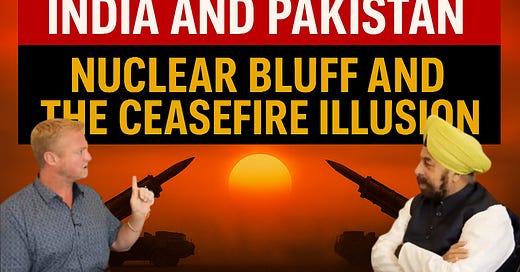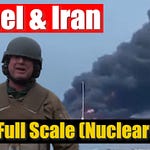As tensions between India and Pakistan rise once again, I’ve come to New Delhi to document what’s really happening on the ground — not from one side, but from as many perspectives as possible. In this report, I sit down with R.P. Singh, national spokesperson of India’s ruling Bharatiya Janata Party (BJP), who presents his party’s sharp and uncompromising stance on the Pakistan conflict, internal security, and India’s economic rise under Prime Minister Modi.
BJP: Terrorism From Pakistan is an Act of War
R.P. Singh began by reiterating Prime Minister Narendra Modi’s recent declaration: any terrorist act will be treated as an act of war by Pakistan. Singh accused Pakistan of consistently using terrorism as a “state policy,” and stated that the Indian Armed Forces now have a “green signal” to retaliate with full military force if attacked again.
He pointed to the recent Operation Sandor as proof of Pakistan’s military complicity in cross-border terrorism, claiming that senior Pakistani generals were seen supporting known terrorist operatives at their final positions. “Pakistan is not just sponsoring terrorism,” Singh said, “they are shielding it.”
“Why Send Aid to Terrorists?” – Pakistan’s Misplaced Priorities
Singh highlighted the economic crisis in Pakistan, questioning how a country begging the IMF for aid can simultaneously allocate ₹14 crore (~$1.7 million) to the family of terrorist Azhar Masood. “They’re funding militants’ families while their own people lack food and water,” he said. According to him, the world must recognize this hypocrisy and take a firmer stance.
Nuclear Bluff and the Ceasefire Illusion
When asked about the dangers of escalation given both countries’ nuclear capabilities, Singh dismissed the possibility of nuclear conflict as a “bluff” repeatedly used by Pakistan. He pointed to prior Indian military operations — from the 2016 surgical strikes to the Balakot airstrikes in 2019 — claiming that India destroyed 11 Pakistani airbases in recent operations with no nuclear response from Islamabad.
“If Pakistan ever attempts a nuclear strike,” Singh warned, “they will cease to exist on the world map.”
India’s Water Leverage: The Indus Treaty in Focus
One of the most contentious topics discussed was the Indus Water Treaty. Singh firmly stated that India holds first right over water originating in its territory and will reconsider its position based on Pakistan’s actions. “We want peace,” he emphasized, “but if Pakistan continues sponsoring terrorism, then we’ll decide how much water flows across the border.”
Why Peace Feels Impossible
I asked Singh the question on many minds: why can’t there be peace? His response was blunt: “Terrorism is embedded in the DNA of the Pakistani state.” He blamed Pakistan’s army and radical ideology for keeping the country locked in confrontation with India, asserting that no economic or democratic progress is possible while terrorism remains a core strategy of the Pakistani state.
Singh accused Pakistan’s leaders — from Musharraf to Imran Khan — of using terrorism as a unifying force to distract from domestic instability.
The Global Misunderstanding of India and Its Democracy
Criticism has emerged from opposition parties and international observers claiming that India’s democracy is eroding. Singh rejected this, saying, “Ask yourself: did I stop you from asking tough questions?” He pointed to elections, press freedom, and rising living standards as proof of a vibrant democracy under BJP governance.
According to Singh, Modi’s policies have lifted 25 crore Indians out of poverty, expanded health coverage to 55 crore, and delivered water connections and housing to millions. He said India is now not only the world’s fastest-growing economy but also a country with one of the most transparent governance systems.
India’s Global Role and Message to the World
Singh stressed India’s emergence as a reliable global partner and economic engine. He encouraged the world to “join the growth story” while warning that failure to engage now would mean “missing the bus” within the next five years. He emphasized India’s democratic system, grassroots electoral strength, and anti-corruption mechanisms as foundations for global investment and cooperation.
Conclusion: More Perspectives to Come
This interview is one of many I’m conducting across India. I’ve already spoken to opposition figures like Dr. Udit Raj of the Congress Party, who offered a critical view of the Modi government. My mission is not to show just one angle — but to expose all sides of the conflict and internal political dynamics so you can make up your own mind.
I’ll be heading closer to the front lines soon to bring even more perspectives from civilians, soldiers, and political leaders on both sides of this historic divide.
My Mission: Unfiltered Truth from the People
I didn’t come to give my opinion — I came to listen.
This report is part of a broader effort to show the human side of geopolitical conflict. I’ll be moving closer to the frontlines soon to bring you even more perspectives, not from pundits or politicians, but from the people themselves.
Please continue to support my independent, crowdfunded reporting. Like, share, and subscribe. Comment below with what you want me to cover next.
I’m completely independent. No networks. Just truth.
✔️ Subscribe to my Substack for full reports and behind-the-scenes stories:
🔗
✔️ Support my work with a ONE TIME donation — every bit helps me keep reporting from the front:
🔗SUPPORT MY JOURNALISM WITH A MONTHLY DONATION
Watch on Youtube
Subscribe to stay updated as we dig deeper into this ongoing and intensifying India-Pakistan conflict — from the political halls of New Delhi to the firing lines on the LoC.












Share this post